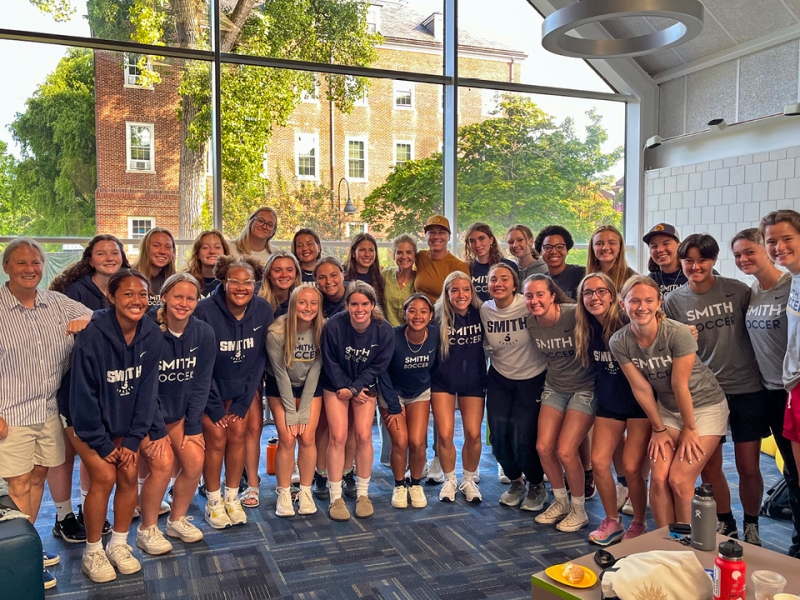Valerie Love ’02, long inspired by the U.S. women’s soccer team, jumped at the chance to volunteer at this year’s World Cup.
The Grécourt Gate welcomes your submissions. To discuss a story idea of interest to the Smith community, contact Barbara Solow at 413-585-2171 or send email to bsolow@smith.edu.
Smith eDigest
The Smith eDigest is sent to all campus email accounts on Tuesday and Thursday each week during the academic year and on Tuesdays during the summer. Items for eDigest are limited to official Smith business and must be submitted by 5 p.m. on the day prior to the next edition’s distribution.

What questions would you ask your childhood hero?
If you’re the Smith soccer team—and that hero is soccer superstar Abby Wambach—then the answer is simple: you ask her about her mindset, about life after soccer and about how she balances it all.
That’s the experience a small group of Smith players had recently when the retired American soccer player and her wife, author and noted queer activist Glennon Doyle, came to campus to chat, have a bite of brunch and tour the campus. The visit was part of a series of campus tours the family was undertaking as part of the familiar ritual of getting their daughters ready for their academic next steps.
Smith players learned of the visit, which was requested by Wambach herself, after a scrimmage against Keene State. Head Coach Kathy Brawn called them together and told them to clear their schedules for the coming Sunday, then she announced the visitor.
“We were screaming on the field about how excited we were,” recalls Raven Tebbetts ’25, a government major and psychology minor. “It’s literally Abby Wambach coming to Smith College to meet with all of us.”
The early Sunday morning Q&A took place on Ainsworth Gym mezzanine, where the players gathered in a semi-circle to talk with Wambach. It was a moment Tebbetts and other players recalled as “surreal.”
Tebbetts, who started playing soccer when she was five, with her dad as a coach, and had been on various teams since, decided to ask the Olympic gold medalist a bit more about what drove her passion for the sport.
“A lot of our questions were based on a mindset,” Tebbetts said. “My question was, if she’s ever found herself playing for other people, instead of playing for herself, how she then learned how to play for herself.”
“Her response was that she never really learned how to play for herself, which is the opposite of what I was thinking,” Tebbetts said. “It took her retiring to realize she had been playing for other people, whether it’s a parent or the country.”
The idea that even those at the highest levels have struggled with separating their athletic performance from their own self-worth stuck with Tebbetts.
“Your teammates are not going to look at you differently because you didn’t get minutes,” she said. “It’s not going to be the end of it all if you don’t get time to play.”
Madelyn Boyle ’24, a double major in government and French, remembers seeing Wambach and asking herself, “Is she actually sitting across from us?”
Boyle, a longtime fan, recalled tuning into all the major soccer competitions as a young player and rushing outside to practice the moves after the games. She can remember the moment when, at 13, she watched Wambach in her last World Cup.
“Seeing the sport you love being played by really powerful women was really impactful,” Boyle said. “It was pivotal in my soccer journey. I would say, ‘I also play that sport.’”
After an injury last year meant she couldn’t play for the rest of the season at Smith, Boyle said she felt stripped of a core part of her identity, an issue she brought to the Wambach discussion. When Boyle asked the superstar what life after soccer looked like, she was surprised to hear that, although the sport had been an amazing boon, the greatest things in Wambach’s life had come after her career as a player was over.
“It was really powerful to hear that someone who literally achieved everything you can achieve in the sporting world thought that the greatest things in her life were not those, but family and happiness,” Boyle said.
Boyle said the idea that an Olympic athlete had struggled with some of the same issues that Smith players also wrestled with, helped put everything into perspective. She, like Tebbetts, took away from the discussion the idea that soccer shouldn’t define her.
“It’s challenging to separate yourself from soccer,” Boyle said. “Being a student comes first. I love being a student at Smith. It’s unique and joyful because athletics is a part of it and my teammates are some of my best friends on the planet."